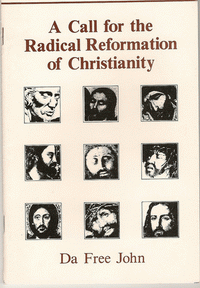
A Call for the Radical Reformation of Christianity
Da Free John
1982
Introduction
Like all the major religious traditions of mankind,
Christianity has changed greatly in the course of its long
history. This change has not been one of simple adaptation
to the changing social and cultural conditions. Rather, it
has led to many reinterpretations of the original Gospel and
a general movement away from the authentic Teaching of Jesus
of Nazareth.
In Jesus’ own time, the Pharisees subjected his Teaching
to endless exercises in hairsplitting exegesis. The
aggressive opposition of the Pharisees (and other
representatives of the religious “establishment”) eventually
led to his crucifixion. Even Jesus’ own disciples wrestled
with the Truth, as is evident, for example, in Peter’s
denial of Jesus during his Master’s trial.
The Message that Jesus of Nazareth brought to the world
is essentially identical to that of all the other great
Adepts: The ego must be transcended in perfect
self-sacrifice to the Divine Reality. This supreme demand is
naturally offensive to the world-embroiled personality.
People are loath to hear this Message. So, they pervert the
Adepts’ Teaching to console their egos. In this manner the
great ego-transcending Way is obscured, and an ego-salvation
cult is substituted for it.
In the days of early Christianity, Paul played a pivotal
role in this process of turning the high Teaching of Jesus
into a merely exoteric religion. Originally a zealot and
fanatic persecutor of Christians, Paul joined the Church
with the same righteous attitude bat he had displayed
before. He appears to have been primarily interested in
converting as many people as possible to the religion about
Jesus the Savior rather than to the practice of the radical
Way of Truth taught by this great Adept. He, was
instrumental in creating a majority who, ignorant of the
true import of the radical Teaching of Jesus, limited their
religious practice to the conventions of social morality and
self-consoling beliefs. The rapidly growing influence of
this exoteric Christian community led to the gradual
suppression of esoteric practice and the virtual loss of the
radical Teaching itself.
Whatever the historical facts about Paul may be, Master
Da criticizes the distinction between the radical
orientation of Jesus the Adept and the conventional or
“official” attitude that is epitomized in Paul’s letters to
his fellow Christians.
Today Christianity is fragmented into several
denominations and numerous sects, all claiming to be
faithful to the original Teaching of two thousand years ago.
More importantly, most Christians no longer have any real
understanding of the high Teaching that was brought into the
world by the founding Adept Jesus. However, not a few
Christians today are yearning for a more convincing and
fulfilling form of Christian practice than conventional
Christianity permits.
It is the function of the great Spiritual Masters to
regenerate the Truth and make it accessible to the men and
women of their own epoch. This always involves a break with
their tradition. Thus, both Jesus of Nazareth and Gautama
the Buddha were critical of current teachings, and their own
new Way clarified and purified the religious beliefs and
practices of their day.
Master Da Free John is the first Adept to be born at a
time when humanity is preparing mature into a unified
world-culture. As with previous World Teachers, his Mission
is to turn mankind to the Truth beyond all supposition,
opinion, prejudice, and experience. In his free criticism of
all forms of seeking, he naturally also considers the major
religious traditions of the world, including
Christianity.
It will become obvious from the following essays that
Master Da is highly critical of conventional Christian dogma
and practice. At the same time, however, he has a more
genuine appreciation for the Adept Jesus and his original
Way than can be witness d in most quarters of Christendom
itself. Master Da’s illuminating critique is a confirmation
to all true practitioners of the fundamental Truth that is
the fountainhead of Christianity.
-The Editors
return to A Call
for the Radical Reformation of Christianity
related pages on Beezone